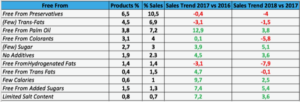
The number of sales of ‘free from products’ is in freefall.
Figures from the Osservatorio Immagino confirm that the growth of + 2.3% in 2017 has fallen to almost 0 (+ 0.1% overall in 2018).
Most of the “free from” products suffered a significant drop in sales: no preservatives (-4%), no dyes (-5.8%), no hydrogenated fats (-7.9%). At the same time, the claim free from palm oil no longer grows in double figures as it did up to 12 months ago. And if it hadn’t been for the new fashion of ‘sugar-free’ and ‘no added sugar’ products the situation would be even worse.

Is it the end of the commercial “free from” trick? It is too early to say that the attraction for the “ree from” label has passed. Consumers have shown they appreciate the exclusion of food. The “free from” an ingredient label reassures them. But they also have proven to be aware that it is a marketing trick, and is used commercially to sell more. In fact, these sales have fallen over time.
The slowdown of the “free from” labeling is not attributable to the fact that the market is now saturated. It is not.
What makes the market fall then? The reasons are multiple and complementary in some cases. The surprise effect is over; the consumers are more aware that the benefits of “free from” products on health are imperceptible or even null, as in the case of palm oil; the consumer is attracted to something else.
The claims “free from” have been used for years in advertising or the packaging of food products to indicate that a product is without a certain ingredient. A very useful marketing tool to inform consumers, but potentially very dangerous because it risks deceiving them.
There is no convenience in changing product formulas by abandoning better quality ingredients to pursue more sales. As these numbers show, consumers quickly understand that these are tricks and companies that thought they had found a way to increase sales get punished with:
- Falling sales levels after a few years;
- Exorbitant costs incurred during product reformulation;
- Less opportunity to invest in sustainability.
Some companies have chosen not to subjugate consumers with slogans but have preferred hard work and science, investing in sustainability and seeking solutions that improve the products and lives of billions of citizens.
The correct way is that which is pursued by citizens entrepreneurs and managers of these large companies that invest time, effort and resources moving towards sustainability. Not that of those who choose shortcuts and deceptions.
The poor commercial practices of ‘free from’ products have been prohibited even in illiberal Turkey. What is Europe waiting for? We must protect the values of the free market and respect consumers without misleading them. Those who promote products that are “free from” do not protect the consumer. They trick them. It does not promote biodiversity but threatens it. It does not favor development but abandons it.
